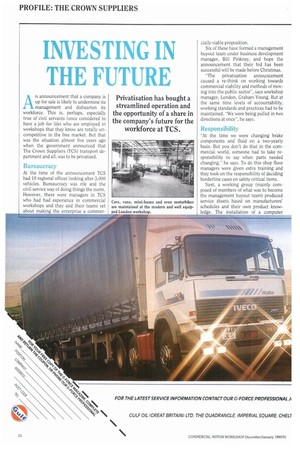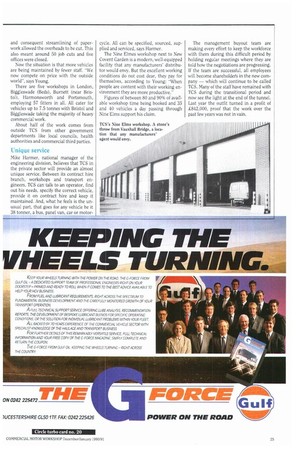INVESTING IN THE FUTURE
Page 100

Page 101

If you've noticed an error in this article please click here to report it so we can fix it.
Privatisation has bought a
streamlined operation and the opportunity of a share in the company's future for the
workforce at TCS.
An announcement that a company is up for sale is likely to undermine its management and dishearten its workforce. This is, perhaps, especially true of civil servants (once considered to have a job for life) who are employed in workshops that they know are totally uncompetitive in the free market. But that was the situation almost five years ago when the government announced that The Crown Suppliers (TCS) transport department and all, was to be privatised.
Bureaucracy
At the time of the announcement TCS had 10 regional offices looking after 3,000 vehicles. Bureaucracy was rife and the civil service way of doing things the norm. However, there were managers in TCS who had had experience in commercial workshops and they and their teams set about making the enterprise a commer
cially viable proposition.
Six of these have formed a management buyout team under business development manager, Bill Pinkney, and hope the announcement that their bid has been successful will be made before Christmas.
"The privatisation announcement caused a re-think on working towards commercial viability and methods of moving into the public sector", says workshop manager, London, Craham Young. But at the same time levels of accountability, working standards and practices had to be maintained. "We were being pulled in two directions at once", he says.
Responsibility
"At the time we were changing brake components and fluid on a two-yearly basis. But you don't do that in the commercial world, someone had to take responsibility to say when parts needed changing," he says. To do this shop floor managers were given extra training and they took on the responsibility of deciding borderline cases on safety critical items.
Next, a working group (mainly composed of members of what was to become the management buyout team) produced service sheets based on manufacturers' schedules and their own product knowledge. The installation of a computer
and consequent streamlining of paperwork allowed the overheads to be cut, This also meant around 50 job cuts and five offices were closed.
Now the situation is that more vehicles are being maintained by fewer staff. "We now compete on price with the outside world", says Young.
There are five workshops in London, Biggleswade (Beds), Burnett (near Bristol), Harmonsworth and Portsmouth, employing 57 fitters in all. All cater for vehicles up to 7.5 tonnes with Bristol and Biggleswade taking the majority of heavy commercial work.
About half of the work comes from outside TCS from other government departments like local councils, health authorities and commercial third parties.
Unique service
Mike Harmer, national manager of the engineering division, believes that TCS in the private sector will provide an almost unique service. Between its contract hire branch, workshops and transport engineers, TCS can talk to an operator, find out his needs, specify the correct vehicle, provide it on contract hire and keep it maintained. And, what he feels is the unusual part, that goes for any vehicle be it 38 tonner, a bus, panel van, car or motor cycle. All can be specified, sourced, supplied and serviced, says Harmer.
The Nine Elmes workshop next to New Covent Garden is a modern, well-equipped facility that any manufacturers' distributor would envy. But the excellent working conditions do not cost dear, they pay for themselves, according to Young: "When people are content with their working environment they are more productive."
Figures of between 80 and 90% of available workshop time being booked and 35 and 40 vehicles a day passing through Nine Elms support his claim.
The management buyout team are making every effort to keep the workforce with Ehem during this difficult period by holding regular meetings where they are told how the negotiations are progressing. If the team are successful, all employees will become shareholders in the new company — which will continue to be called TCS. Many of the staff have remained with TCS during the transitional period and now see the light at the end of the tunnel. Last year the outfit turned in a profit of .£842,000, proof that the work over the past few years was not in vain.












































































































